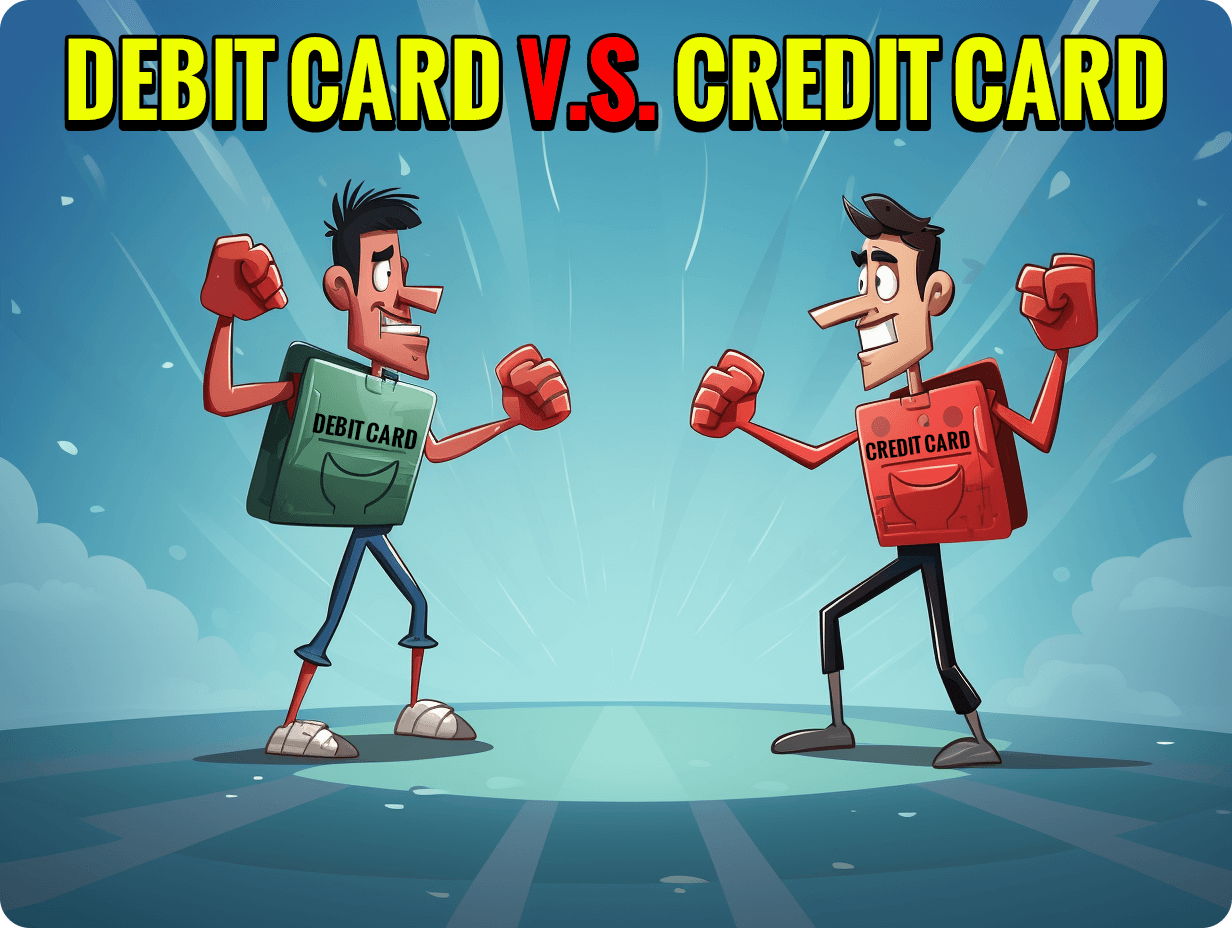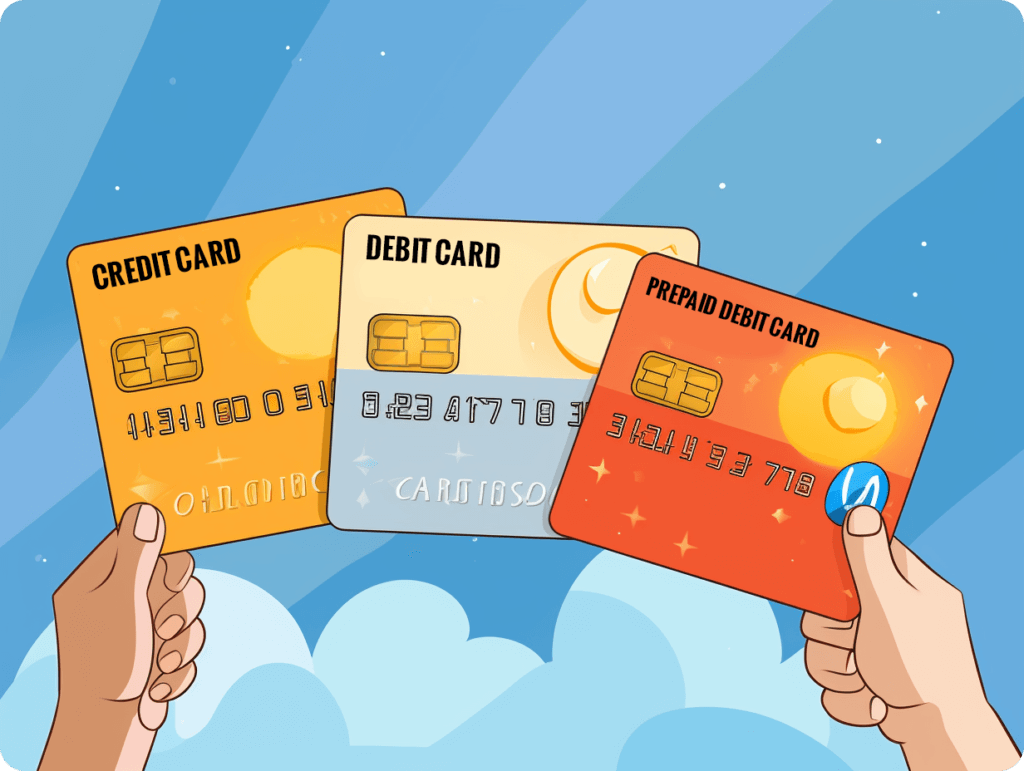- Blogs
- /
- Credit Card vs. Debit Card: Difference Between Debit Card and Credit Card
Credit Card vs. Debit Card: Difference Between Debit Card and Credit Card

Summary
Have you ever wondered how credit and debit cards differ? Each offers unique benefits, impacting your financial management in distinct ways. Understanding these differences is crucial when choosing the right card for your needs.
For example, credit cards offer added security against theft and fraud. Debit cards provide a more straightforward way to track spending. Many people need both for different purposes. Some prefer using one over the other.
When researching credit card vs debit card, consider network availability, customer protection, and usability. This will help you make informed decisions. So, what exactly are their differences, and which one suits you best? Let’s explore the ins and outs of credit and debit cards to help you decide.
Key Takeaways
- Credit cards allow purchasing without immediate funds. They also let users pay for significant expenses over time. They offer an added security layer unlinked to bank accounts.
- Debit cards immediately deduct funds from your account. They help with expense tracking and limit spending to available balances.
- Credit cards enable borrowing money from the bank for purchases. They help build a positive credit history through timely payments.
- Responsible usage maintains a good credit score, which is crucial for future loans. It also determines credit limits based on income, score, and existing debts.
- Debit cards withdraw funds directly from your bank account without interest charges.
- Debit card transactions need a PIN or signature for security. This limits spending to available funds. Overdraft fees can occur if spending exceeds the account balance.
- Prepaid cards allow loading specific amounts for budgeting and controlled spending. There is no overdraft risk or debt accumulation here as they aren’t linked to bank accounts.
Overview of the Different Card Types

Credit Basics
A credit card allows you to borrow money from the bank to make purchases. When you use a credit card, you take out a short-term loan. You can build a positive credit history by making timely payments. This is important because it shows financial institutions you’re responsible when handling debt.
Use your credit card responsibly by making all payments on time. This helps maintain a good credit score.
A good credit score is crucial for future loan applications, such as mortgages or car loans. Financial institutions use this as a metric for determining credit limits. Other metrics include your income and other debts.
Paying only the minimum each month can accumulate high interest over time. It’s essential to understand how interest rates work. Aim to pay off the entire balance whenever possible.
Debit Fundamentals
A debit card allows you to access funds directly from your bank account. You can use it to make purchases or withdraw cash from ATMs. Unlike a credit card, a debit card has no interest charges. You’re spending money already in your account.
When using a debit card for transactions at stores or online, merchants ask for your signature or PIN. The PIN adds an extra layer of security. It ensures that only authorized users can complete transactions.
Debit cards have one key advantage: they limit your spending to the funds in your bank account. This helps you avoid debt accumulation. Yet, it’s essential to keep track of your spending. This way, you won’t overdraft your account and incur bank fees.
Prepaid Debit Overview
Prepaid debit cards give users more flexibility and control over spending. It does this much better than traditional debit or credit cards. These cards allow individuals to load them with specific amounts of money beforehand. This is ideal for budgeting or controlling expenses. It’s related to specific activities, like travel or shopping.
Prepaid cards aren’t linked to bank accounts. There’s no risk of overdrawing funds beyond the initial load. This means there won’t be any accumulated debt due to overspending beyond one’s means.
Managing expenses becomes more manageable when using prepaid cards. Once you spend the preloaded amount, further transactions will be declined. More funds must be added to the card to continue using it.
Credit Card vs Debit Card: Operational Mechanics
Credit Functionality
Credit cards allow you to make purchases even when your bank account is low on funds. This means you can buy something now and pay for it later. For example, you can use a credit card to buy a new bicycle but don’t have all the money now. Then, you can pay off the cost over time.
Another advantage of using a credit card is that it allows you to pay for significant expenses over time. You must fix something big in your house, like the roof or plumbing. With a credit card, you can spread the payments over several months instead of paying all at once.
Using a credit card responsibly helps build a positive credit history. Credit bureaus receive this information every time you make timely credit card payments. This helps improve your credit score.
In summary, the benefits of credit cards include:
- Ability to make purchases without available funds
- Paying for significant expenses over time
- Convenience for online shopping and reservations
- Building a positive credit history through responsible use
Debit Transactions
Debit cards work differently from credit cards. When purchasing, they draw money from what is already in your bank account. When you use it at a store or online, the amount spent is immediately removed from your account balance.
One benefit of using debit cards is avoiding interest charges and potential debt. Transactions with debit cards use money already in your bank account. There’s no borrowing, as with credit cards. So, there’s no risk of accumulating debt or paying interest fees.
Debit transactions also make tracking expenses more convenient. Every purchase instantly affects your available balance. You can easily track where your money goes by checking your monthly bank statements. You can do this through their online banking platforms.
Key Differences Unveiled
1. Spending Limits
Credit cards have higher spending limits compared to debit cards. Debit cards limit spending to the available balance in your bank account. This means you can only spend what you already have in your account.
However, your creditworthiness and repayment history determine the limit on credit cards. If you make timely payments and use your credit card wisely, your credit limit will increase.
For example:
- If someone has a credit card with a $5,000 limit and has already used $3,000 of it, they can still spend up to $2,000 more. They can do this as long as they pay off their monthly balance.
- A person with a debit card linked to a $500 account cannot spend more. They can only spend more if they deposit more funds into their account.
Debit cards provide a natural spending limit. This prevents overspending. You can’t spend more money than what’s available in your bank account.
2. Payment Flexibility
With credit cards, you can make a minimum payment if you cannot pay off the balance. You can also carry over the remaining balance for future months. However, debit cards require immediate payment. When you buy with a debit card, you are immediately charged from your bank account balance.
Let’s say:
- If someone buys $100 worth of groceries using their credit card, they can pay $25 now (the minimum). Then, proceed to spread out the rest over several months.
- Another individual makes the same purchase but uses their debit card. In this case, $100 will be immediately debited from their checking account.
In other words, credit card payments can be spread over time. This depends on whether one pays only part of what’s owed or clears everything at once. In contrast, the entire sum of debit card transactions is automatically deducted from one’s bank account.
3. Grace Periods
These two types of cards have one significant difference related to grace periods. Credit cards often come with grace periods before interest is charged on purchases. No interest accrues on new purchases during this period (usually 21–25 days).
Full payment by the due date prevents interest from accruing. Debit cards do not have grace periods. Funds are immediately deducted from one’s checking or savings accounts upon purchase.
Advantages of Credit Cards
Responsible credit card usage is crucial for establishing and improving credit history. Debit card transactions do not impact credit scores or contribute to credit history. Using a credit card does.
Regularly paying credit card bills on time demonstrates financial responsibility. It positively affects an individual’s credit profile. Moreover, using a mix of both credit and debit cards can help build a well-rounded credit history.
Also, earning rewards through responsible credit card usage can benefit frequent spenders. Many credit cards offer rewards programs, such as cashback or travel points. The programs incentivize users to make purchases with their cards.
Debit cards generally do not provide rewards or bonuses for spending. They focus on convenience rather than incentivizing expenditures.
Understanding the specific purchase protections your credit card company offers is essential. Credit cards may provide extensive purchase protection against fraud or faulty products. This is in comparison to debit cards.
Disputing unauthorized charges is also easier with a credit card. Its built-in protections are often more thorough than those of debit cards.
Understanding Debit Card Merits
1. Avoiding Debt
Responsible use of credit cards involves paying off balances in full each month. This practice prevents accumulating debt and helps maintain a good credit score. Debit cards, however, cut the risk of getting into debt.
They only use available funds from your bank account. You can avoid overspending and potential debt with credit cards by monitoring your spending. But opting for debit cards over credit cards can be a proactive approach to debt prevention.
Using a debit card limits spending to what’s in the bank. This encourages financial responsibility. Credit cards allow users to spend money they don’t have. In contrast, debit cards only permit purchases within existing funds.
For example, if someone has $100 in their checking account and tries to make a $150 purchase using a debit card, the transaction will typically be declined. This happens because there aren’t enough funds in the account.
In contrast, individuals using credit cards may find it tempting to spend beyond their means. There is no immediate impact on their available funds at purchase. This could lead to accruing high-interest debt. It can become challenging to pay off later.
2. Direct Access to Funds
Using a debit card provides direct access to funds in your bank account. You can use it for making purchases or withdrawing cash from ATMs. The amount spent is immediately deducted from your available balance. You do not need to repay it later.
Credit cards allow you to borrow money from the issuing institution. The borrowing limit is based on your creditworthiness and the terms of the agreement.
When you make an online purchase using a debit card with enough funds, it goes through instantly. You wouldn’t need to pay it back. This is because it directly taps into those available funds for settlement.
But if you were doing this same transaction with a credit card instead of a debit card, it would mean borrowing money against an agreed-upon line of credit offered by the issuer. You would need to repay it during the following billing cycles. You would also face interest charges if you didn’t pay it off entirely.
3. Fee Structures
Credit cards often come with various fees. For example, annual fees are charged for maintaining an active account. Late payment fees are imposed when monthly payments are not made on time. You incur balance transfer fees when you move existing balances from one card to another.
Debit cards usually have fewer fees than traditional credit cards. They offer an affordable way to make transactions.
However, it’s crucial to understand fee structures when selecting financial products. This applies to debit and credit cards. This selection is based on individual preferences and requirements. Choosing the most suitable and cost-effective option that meets your needs would be best. Do this by comparing fee structures across various options.
Safety and Security Features

1. Fraud Protection Measures
Credit cards often provide more comprehensive coverage than debit cards. Most credit card issuers offer zero liability policies. This means cardholders are not responsible for unauthorized transactions. However, debit cards may have limited fraud protection. The extent of this protection varies among different financial institutions.
Promptly reporting any unauthorized charges is crucial for both credit and debit cardholders. This proactive approach can help mitigate potential losses. It can also prevent further fraudulent activities on the account.
Users should familiarize themselves with their specific card’s fraud protection policies. They need to understand their rights and responsibilities in case of fraudulent transactions.
For example:
- Credit Card: A user notices an unfamiliar charge on their credit card statement. By promptly reporting it to the issuer, they can avoid being held liable for the unauthorized transaction.
- Debit Card: If a user’s debit card information is compromised, timely reporting of unauthorized activity is vital. It can limit potential financial losses.
2. Impact on Credit Scores
The impact on credit scores differs between credit cards and debit cards. Responsible credit card usage can positively impact an individual’s credit score. This occurs when individuals consistently make timely payments. They also maintain a low utilization ratio, which is the amount of available credit used.
Debit card transactions are not reported to credit bureaus. They do not affect an individual’s credit score—neither positively nor negatively. Using a debit card does not contribute directly to building or improving one’s creditworthiness. Thus, it does not help you build or improve your credit.
Regularly track your credit reports. This is crucial, regardless of whether you use a debit or a credit card. Doing so helps ensure accuracy in the report data. It also enables individuals to identify potential issues early on.
Remember that:
- Timely repayment of outstanding balances reflects positively on an individual’s payment history. This is a critical factor influencing their credit score.
- Debit cards work differently than credit cards. Funds come from existing accounts. Debit card transactions don’t affect traditional FICO® Scores or VantageScores®.
The Financial Implications
1. Interest and Fees Compared
Credit cards charge interest on unpaid balances, while debit cards do not. Understanding the associated costs is crucial. Choosing a low-interest credit card can cut expenses if carrying a balance.
Credit cards add interest when you don’t pay the total monthly amount. This makes them financial products that can lead to extra costs. Debit cards use available funds from your bank account. They do not add any interest or fees.
Low-interest credit cards benefit those who occasionally carry a balance. They help reduce downsides such as high interest charges. Comparing different credit card options is essential. It helps identify the most favorable terms, including interest rates and fees.
Debit cards use available funds directly from your bank account. They stop potential debt concerns. Responsible usage of credit cards involves paying off balances in full each month. This avoids accumulating debt.
Choosing between credit and debit cards depends on individual financial habits. Debit cards help individuals aiming for a debt-free lifestyle stay financially stable.
2. Debt Potential
Credit card usage can accumulate debt if not managed responsibly. This makes them more susceptible than debit cards.
Responsible handling of credit card payments involves ensuring balances are paid off monthly. Failure to do so may result in mounting debts. This is due to high interest charges on outstanding amounts. Using only the money in one’s bank account through a debit card eliminates any risk of debt.
Rewards and Costs Evaluated
1. Annual Fees
Credit cards often have annual fees to cover benefits and rewards. Debit cards typically do not have yearly fees since they are linked to bank accounts. They provide a convenient and fee-free payment option for everyday transactions. When choosing a credit card, you should confirm the benefits are worth the annual fee.
Someone considering a credit card may decide between travel points and cashback rewards. But they get charged an annual fee. In this case, they should check their spending habits. They need to determine if the potential rewards offset this cost.
In contrast, individuals who avoid extra expenses may find that using a debit card aligns better with their financial goals. It has no annual fees. Consumers must weigh these factors when deciding between either card for everyday purchases.
2. Rewards Programs
Credit cards often have rewards programs, like cashback or travel points. These programs encourage spending. These programs benefit frequent spenders. They can earn rewards through their credit card usage.
However, debit cards generally do not provide rewards or bonuses for spending. They focus more on convenience rather than incentivizing expenditures.
Someone who travels often might enjoy a credit card with travel-related rewards programs. It could help them save money on flights or accommodations over time. Individuals who prefer simplicity in managing their finances may find that using a debit card suits their needs better. They won’t need to worry about meeting specific spending requirements to earn rewards.
When comparing the costs and benefits of these options related to reward programs, especially on regular spending, it becomes evident why some people prefer one over the other. They choose the option that aligns best with their lifestyle and financial objectives.
Utilization Strategies

Optimal Card Usage
It’s essential to understand the best ways to use each card type. Credit cards are perfect for significant purchases or emergencies requiring immediate funds. A credit card can provide the financial flexibility you need if you need to pay for car repairs.
On the other hand, debit cards are more suitable for everyday expenses. They are good for managing regular bills, such as groceries, gas, and utility payments.
Understanding your financial needs is crucial. It helps determine the best way to use each card type. Using a debit card is convenient if you make frequent small monthly transactions. It also enables you to keep track of your spending more effectively.
Generally, either card can offer flexibility and convenience based on specific situations. For example:
- Using a credit card with travel rewards for booking flights or hotels.
- Using a debit card for daily expenses like dining out or buying groceries.
- Having both types of cards available provides options depending on individual circumstances.
Knowing which payment method suits each transaction will help make informed decisions. You can decide when to use a credit or debit card.
Avoiding Debt with Cards
One critical aspect is avoiding debt accumulation when using credit cards. It’s vital to check credit card balances regularly. This prevents unexpected debt from piling up.
Responsible budgeting ensures you have enough funds to pay off any credit card balances at the end of each billing cycle.
Maintaining strict financial discipline poses challenges. Using debit cards instead of credit cards may be beneficial. It eliminates the risk associated with accumulating debt due to overspending.
Choosing the suitable payment method aligns with your financial habits and discipline level. It can effectively reduce potential debt issues.
Here are some critical points on the responsible use of both card types:
- Regularly monitoring monthly statements helps identify any unusual activities early.
- Setting budgets and tracking expenses ensures adequate funds are available. This helps before making large purchases.
- Understand personal spending patterns to assist in selecting appropriate payment methods.
Situational Card Usage
When to Use Debit
A debit card is ideal for everyday expenses like groceries, gas, and dining out. It allows you to spend within your means. The funds are directly deducted from your checking account. This helps avoid interest charges. It also prevents potential debt from credit cards.
Opting for a debit card also makes sense when avoiding interest charges. It also helps you resist the temptation of spending money you don’t have. This prevents you from accumulating debt or interest fees.
Debit cards are convenient for accessing cash from ATMs without extra fees. If you prefer not to carry large amounts of money but want easy access when needed, a debit card can be very handy.
Finally, choosing debit over credit is beneficial when real-time transaction updates matter. Most banks provide instant notifications on transactions made with your debit card. This feature offers transparency and helps keep track of your spending habits.
When to Prefer Credit
Using credit cards is more suitable for larger purchases requiring immediate funds. This is because immediately debiting your checking account may strain it.
For example, booking airline tickets or making hotel reservations requires large upfront payments. This could affect one’s monthly budget if paid through their checking account.
Choosing credit also becomes helpful when rewards or cashback programs are involved. Most debit cards’ reward systems don’t offer these incentives.
Strategically use credit cards for such purchases. Promptly pay off the balance before accruing any interest charges. This way, you can take advantage of these reward programs. You can also be financially prudent.
Furthermore, credit cards provide added purchase protection against fraud or faulty products. This is due to federal regulations like the Fair Credit Billing Act (FCBA). The FCBA safeguards consumers’ rights on unauthorized credit card transactions.
Finally, choosing credit over debit becomes essential when building or improving credit history. Responsible usage and timely payments positively impact an individual’s credit score.
Concluding the Comparison
Credit and debit cards have distinct differences catering to varying financial needs. Debit cards are linked to a checking account. They allow users to spend only what they have in their accounts. This promotes responsible spending.
On the other hand, credit cards enable users to borrow money up to a specific limit. They must repay it with interest if not paid in full each month.
Credit cards offer rewards such as cashback or travel points. Debit cards provide immediate access to funds without accruing debt. However, individuals must use credit and debit cards responsibly. They can do this by monitoring their spending habits and staying within their means.
Credit card rewards can be enticing. They often have high interest rates if balances aren’t paid off monthly. Debit card usage eliminates the risk of accumulating debt. However, it lacks the perks associated with many credit card programs.
Responsible usage is paramount. Users should avoid overspending and prioritize timely bill payments for credit card balances. Also, ensure enough funds are in their checking accounts for debit card transactions.
Choosing between both cards depends on an individual’s financial goals and circumstances. A well-managed credit card can be an effective tool for building credit history. But, a debit card may benefit individuals who want to stick to a strict budget and avoid potential debt.
Final Considerations
Personal spending habits determine if an individual needs a credit or debit card. Those who make impulse purchases might enjoy using a debit card. It’ll limit spending to only available funds.
Financial discipline is critical when selecting between both cards. Understanding one’s tendencies toward managing money can significantly influence this decision-making process.
It’s essential to research different payment options before choosing one. Comparing fees for each transaction type helps individuals make informed decisions. They’ll align with their needs.
Seeking advice from financial advisors or banking professionals can provide valuable insights. They can help you choose between these payment methods based on unique circumstances.
Individuals can make personalized decisions by considering personal finance objectives and habits. This includes building a positive credit history and maintaining strict budget adherence.
FAQs
1. What are the key differences between credit cards and debit cards?
Credit cards allow you to borrow up to a specific limit. Debit cards only enable you to spend what’s in your bank account. With a credit card, you take out a loan with each purchase. A debit card only deducts funds directly from your account.
2. How do safety and security features differ between credit and debit cards?
Both types of cards offer protection against unauthorized transactions. Credit cards generally have more robust fraud liability policies. If fraudulent charges occur on your credit card, the issuer’s money is at stake rather than yours. Debit card fraud can lead to direct losses from your bank account.
3. What are the financial implications of using a credit card vs debit card?
Using a credit card responsibly can help build or improve your credit score. But using a debit card won’t impact your credit history. This is because it’s linked directly to funds in your bank account. However, using a debit card won’t lead to debt accumulation as credit card usage does.
4. Are there specific utilization strategies for maximizing benefits from both types of cards?
Strategically using credit cards involves paying off balances in full each month. This helps you avoid interest charges. It also helps you capitalize on rewards programs. Some banks offer debit cards or cashback. They also have reward programs. These can make everyday purchases more rewarding without accruing debt.
5. When is the best time to use each payment method based on different situations?
Credit cards have consumer protections. They are beneficial for making large purchases or booking travel. Credit cards can also earn rewards like airline miles or cash back. Debit cards are ideal for daily spending. They ensure you only spend what you have in your checking account.
Our Latest Blogs:
FREE Strategy Session to Fix Your Credit Blogs / Facebook Twitter Linkedin Instagram Share Summary Unlock the secrets to...

ThisIsJohnWilliams
FREE Strategy Session to Fix Your Credit Blogs / Facebook Twitter Linkedin Instagram Share Summary How long does an...

ThisIsJohnWilliams
FREE Strategy Session to Fix Your Credit Blogs / In today’s economy, credit repair specialists are indispensable. Creditworthiness is...

ThisIsJohnWilliams
FREE Strategy Session to Fix Your Credit Blogs / Facebook Twitter Linkedin Instagram Share Summary Get your financial freedom...

ThisIsJohnWilliams

ThisIsJohnWilliams
FREE Strategy Session to Fix Your Credit Blogs / Facebook Twitter Linkedin Instagram Share Summary How to get late...






